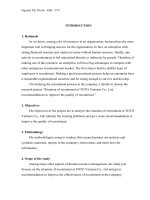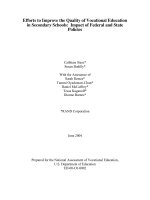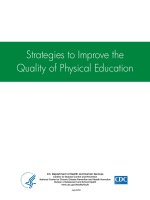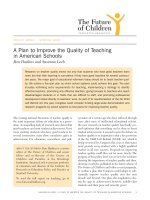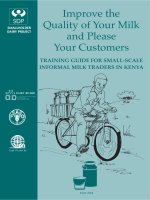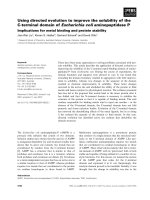Strategies to improve the quality of educational inspection activities in thanh hoa province
Bạn đang xem bản rút gọn của tài liệu. Xem và tải ngay bản đầy đủ của tài liệu tại đây (510.23 KB, 129 trang )
STRATEGIES TO IMPROVE THE QUALITY OF EDUCATIONAL
INSPECTION ACTIVITIES IN THANH HOA PROVINCE
___________________________
A DISSERTATION
Presented to the Faculty of the Graduate School
Southern Luzon State University, Lucban, Quezon, Philippines
in Collaboration with
Thai Nguyen University, Socialist Republic of Vietnam
___________________________
In Partial Fulfillment
of the Requirements for the Degree
Doctor of Philosophy in Educational Management
___________________________
By
LE MINH HUNG (TEN)
October 2014
i
APPROVAL SHEET
ii
CERTIFICATE OF ORIGINALITY
iii
ACKNOWLEDGMENT
The researcher wishes to extend his most sincere gratitude to the
following people, who in one way or another, made this piece of work a reality:
Dr. Cecilia N. Gascon, President of Southern Luzon StateUniversity,
Republic of the Philippines, who made possible the linkage with Thai Nguyen
University and the offering of Doctor of Philosophy in Educational
Management, through the ITC-TUAF;
Dr. Dang Kim Vui,
President of Thai Nguyen University, who
developed the linkage with Southern Luzon StateUniversity, Republic of the
Philippines and the offering of Doctor of Philosophy in Educational
Management, through the ITC-TUAF;
Dr.Apolonia A. Espinosa, his research adviser, for her support and
supervision throughout his graduate study program. Her advice and support
during the conduct of his study has greatly helped him a lot;
Prof.Nordelina B. Ilano, Director, Office for International Affairs of
SLSU for her outright assistance to the Ph.D. students;
Dr. Tran Thanh Van, the Dean of the Graduate School of Thai Nguyen
University, for hisassistance and encouragement to pursue this study;
Dr. Dang XuanBinh, the Director of International Training Center, for
his indefatigable effort to encourage the Ph.D. students to pursue this study;
iv
To all the SLSU and TNU Professors, who unselfishly shared their time
and knowledge throughout the graduate studies in Thai Nguyen University,
Vietnam;
Special
thanks
to
his
family
and
friends
for
their
support,
encouragement and for being the sources of greatest inspiration, which made
his career a success.
LMH
v
DEDICATION
This piece of work is dedicated to my family.
LMH
TABLE OF CONTENTS
vi
PAGE
TITLE PAGE ………………………………………………………………..
i
APPROVAL SHEET ……………………………………………………….
ii
CERTIFICATE OF ORIGINALITY ………………………………………..
iii
ACKNOWLEDGMENT …………………………………………………..
iv
DEDICATION ………………………………………………………………
vi
TABLE OF CONTENTS …………………………………………………..
vii
LIST OF TABLES ………………………………………………………….
ix
LIST OF FIGURES…………………………………………………………
xi
LIST OF APPENDICES …………………………………………………...
xii
ABSTRACT …………………………………………………………………
xiii
CHAPTER
I
II
III
INTRODUCTION …………………………………………….
1
Background of the Study ……………………………………
5
Objectives of the Study ……………………………………..
7
Hypothesis ……………………………………………………
8
Significance of the Study ……………………………………
8
Scope and Limitation of the Study …………………………
9
Definition of Terms …………………………………………..
10
REVIEW OF LITERATURE ……………………….……….
12
Conceptual Framework …………………...….………..……
48
Research Paradigm ……………………………...….………
50
METHODOLOGY ……………………………………………
52
Locale of the Study ………………………….………………
52
Research Design …………………………….………………
52
Population and Sampling ………………….…...…………..
53
Instrumentation………………………...…………..…….….
53
Data Gathering Procedure …………………………….…...
54
Statistical Treatment …….…………………………………..
55
vii
IV
RESULTS AND DISCUSSIONS ……………………….….
V
SUMMARY, FINDINGS, CONCLUSIONS AND
RECOMMENDATIONS
57
Summary …………………..…………………………………
78
Findings…………………….………..…………………….…
79
Conclusions ……………………………………………….…
81
Recommendations ……………………………………..……
82
REFERENCES ……………………………………………………………..
84
APPENDICES ……………………………………………………………...
88
CURRICULUM VITAE …………………………………………………….
112
viii
LIST OF TABLES
TABLE
1
2
3
4
5
6
7
8
9
10
11
12
13
PAGE
Weighted Mean and Rank Distribution of the Responses on
Educational Inspection Activities in terms of Professional
Inspection……………………………………………………………….
57
Weighted Mean and Rank Distribution of the Responses on
Educational Inspection Activities in terms of Inspection
Management ……………………………………………………………
59
Weighted Mean and Rank Distribution of Educational
Inspection Activities in terms of Complaint Management …...
60
Educational Quality of the Respondent Schools as to
Educational Qualification of Teachers …………………………….
61
Educational Quality of the Respondents' School as to
Performance of Students………………………………………….
63
Difference between the Schools and their Educational Inspection
Activities in Terms of Professional Inspection…………………….
64
Difference between the Schools’ Educational Inspection
Activities in termsof Inspection Management ………………..
65
Difference between the Schools’ Educational Inspection
Activities in terms of Complaint Management ………………..
66
Relationship of Educational Qualifications of Teachers to the
Educational Inspection Activities in terms of Professional
Inspection …………………………………………………………
67
Relationship of the Educational Qualifications of Teachers to
the Educational Inspection Activities in terms of Inspection
Management ……………………………………………………..
68
Relationship of the Educational Qualification of Teachers to
the Educational Inspection Activities in terms of Complaint
Management ……………………………………………………..
69
Relationship of the Performance of Students to the
Educational Inspection Activitiesin terms of Professional
Inspection…………………………………………………………
70
Relationship of the Performance of Students to the
Educational Inspection Activitiesin Terms of Inspection
Management ……………………………………………………..
71
ix
TABLE
14
PAGE
Relationship of the Performance of Students to the
Educational Inspection Activitiesin terms of Complaint
Management ……………………………………………………..
x
72
LIST OF FIGURE
FIGURE
1
PAGE
Paradigm of the Study………………………..…………………...
xi
50
LIST OF APPENDICES
APPENDIX
PAGE
A
Educational Inspection Activity ……………………………..
89
B
Questionnaire ………………………………………………...
92
C
Certificate of Verification …………………………………….
96
D
Statistical Computation ……………………………………...
105
xii
ABSTRACT
Title of Research
: STRATEGIES TO IMPROVE THE QUALITY OF
EDUCATIONAL INSPECTION ACTIVITIES IN
THANH HOA PROVINCE
Researcher
: LE MINH HUNG (TEN)
Degree Conferred
: DOCTOR OF PHILOSOPHY IN EDUCATIONAL
MANAGEMENT
Name and Address
of Institution
: Southern Luzon State University Lucban, Quezon,
Philippines and Thai Nguyen University, Socialist
Republic of Vietnam
Adviser
: Dr. Apolonia A. Espinosa
Year Written
: 2014
______________________________________________________________
This study was conducted to find out the strength and weaknesses of
educational training quality of all school levels in ThanhHoa Province during
the Academic Year 2012-2013. This study used the descriptive design in
analyzingthe variables. It is designed to help determine the extent to which
different variables are related to each other. Based on the data gathered, the
following are the findings: The level of educational inspection activities in
terms of professional inspection shows that all the teachers in ThanhHoa
Province were always using standard grade equivalent with a mean score of
5.00. Teachers were also often pursuing their graduate studies with a mean
score of 4.40. Only few teachers were observed to retain or make their
student competent with a mean score of 1.98. In general, the professional
inspections in ThanhHoa were sometimes observed with grand mean of 3.32.
While on the level of educational inspection activities in terms of inspection
management, it shows that the management of the schools in ThanhHoa
have always set specific date for the examination. The administrative activities
xiii
of the principal and the school managing board always abided to the
instruction of the education and training branch. But the transparency on
school finances among students, staff and parents were sometimes observed.
In general, the inspection management was oftentimes observed with
weighted mean of 3.89. On the level of educational inspection activities in
terms of complaint management, it shows that unresolved complains are often
directly referred to the person who has the highest education management
with mean score of 4.26. But they are sometimes resolved with immediate
remedy in five working days with mean score of 2.66. In general, complaint
management inspections were sometimes observed with grand mean of 3.30.
Data further show that out of two-hundred eighty-nine (289) teachers, twentysix percent (26%) had already attained their master’s degree and the rest
were still at their bachelor’s degree. Data reveal that the students in high
school performs 70 to 75 percent in classroom level, 50 to 65 percent in interschool level and only 25 to 35 percent got into regional level; the students’
performance in secondary school was 40 to 50 percent in classroom-level, 35
to 40 percent performance in inter-school level and 15 to 20 percent
performance in provincial level. And, data show that the performances of the
students in primary schools was 45 to 55 percent in classroom level, 40 to 50
percent in inter-school level and 20 to 35 percent were in provincial level. In
view of the significant difference of the educational inspection activities in
terms of professional inspection of the ten schools, results show that the
observed professional inspection were significantly different from the ten
schools. Thus, the ten schools in ThanhHoa Province have different level on
their educational inspection activities in professional inspection. In terms of
xiv
inspection management of the ten schools, results show that the observed
inspection management was the same as observed in the ten schools in
ThanhHoa. Thus, the ten schools in ThanhHoa Province have same level on
their educational inspection activities in inspection Management. In terms of
complaint management, it shows that the observed complaint management
was the same. It shows that the educational degree of the teachers in
ThanhHoa Province doesn’t affect the level of professional inspection of the
school, thus, the level of the educational inspection activities of the school in
terms of professional inspection is not affected by the educational degree of
the teacher. Based on the findings, it is therefore concluded that Educational
inspection activities as toprofessional inspection, inspection management,
and complaint management need some adjustment or fix up; The
performance of the students is of average level only; The respondents of the
study have variations in their responses as to professional inspection.
However, there is commonality of response as to inspection management and
complaint management; The educational inspection activities in various
schools in ThanhHoa province is not associated with the educational
attainment of the teachers; The performances of the students in classroom
level are related with the educational activities in terms of the complaint
management; and The proposed inspection activity program is ready for
implementation. The researcher therefore recommends to undertake the
following proposed activities: The proposed educational inspection activity
program may be implemented by the different schools in Than Hoa Province
to further enrich and revitalize the present educational inspection activities. .
In terms of professional inspection activities, teachers and head masters
xv
should be encouraged to pursue higher education for better outcome in
student learning and school development, thus, making them productive and
dynamic;In terms of inspection management, school management should
practice the principle of transparency of the schools’ finances among the
students, staff and parents in order to achieve the desired goals as mandated
by the ministry; and In terms of complaint management, school management
should provide trainings for mediators and/or principals who handle
grievances/complaints among erring teachers and staff, and likewise establish
logical and judicious policy in resolving complaints to avoid resentment and
distrust among its constituents; Provide in-service trainings for educational
inspectorates for a more effective implementation of educational inspection
activities to ensure educational quality assurance at educational institutions;
propose functional and practical measures to ensure educational law
enforcement in terms of educational inspection activities; and
A need to
increase the number of qualified and professional educational inspectors must
be considered for a more effective monitoring of the performances of the
different schools in ThanhHoa.
xvi
1
Chapter I
INTRODUCTION
Vietnamese education is a socialist education with popular, national,
scientific, and modern characteristics wherein educational activities are
conducted on the principles of learning coupled with practice, education linked
with production, theories connected to practicability, and education at schools
combined with education in the family and in the society (Education Law in
Vietnam, 2005). Educational development is the first national priority with a
view of improving people’s knowledge, training manpower, and fostering
talents. It must be linked with the requirements of socio-economic
development, to the scientific-technological advances,and to the consolidation
of
national
defense
and
security;
must
implement
standardization,
modernization, and socialization; must ensure the balance in terms of
qualifications, professional and regional structure; must expand scale on the
basis of quality and efficiency assurance; and must link education with
employment.
In terms of State management of education, it is written in the
Education Law in Vietnam Chapter 1,Article 14 that: the State shall carry out
the unified management of the national educational system in terms of goals,
programmes, contents, educational plans, teachers’ standards, examination
regulations and system of degrees/diplomas; focus on the management of
educational quality, exercise decentralization on educational management;
strengthen the autonomy and accountabilities of educational institutions.In
view of this, the educational management staff is expected to play an
important role in organizing, managing and directing educational activities;
2
they must study and improve themselves continuously in terms of moral
standards,
qualifications,
management
competence
and
personal
responsibility. The State therefore shall have plan to build and improve the
quality of educational management staff in order to promote roles and
responsibilities of educational management staff, ensuring the development of
the cause of education.
To meet the requirements of the country’s goals in national education,
it is necessary and urgent to review and apply some applicable innovation
strategies and policies in education and training in the way it is pointed out by
Vietnam Government. To strengthen education and training career, first and
foremost the educational management in the country must be improved.
However, managing education involves
other problems. Many
documents have emphasized the importance of changing educational
systems in general and educational inspection in particular, which are the
most vital stage in managing education. In this context, it is the sole
responsibility of the educational management staff to submit to the
government major guidelines affecting learningrights and duties of citizens
nationwide, orientations for reform of educational management related to the
whole educational levels.
Since the birth of social science, many scientific fields of the inspection
have been discussed. According to Mac-Anghen (2009), "inspection is a
process that requires the government management in developing individuals
to perform better". On the other hand, Wanga (2008) noted that inspection
can be conceptualized as overseeing, which involves directing, controlling,
reporting, commanding, and other such activities that emphasize the task at
3
hand and assess the extent to which particular objectives have been
accomplished within the bounds set by those in authority for their
subordinates.
During the first inspection conference held on April 19, 1955 in Ho Chi
Minh, the Vietnam President said: "Through inspection, it helps the inspectors
see
if
the
given
policies
and
missions
have
been
completed
successfully."Inspecting regularly can minimize the misinterpretation of the
education management policies of any organizations.
Inspection is an important stage of the entire educational management
of the government. It enables leaders to evaluate their own leadership and
other authorized officials to find out the most effective ways of management in
line with the policies set by the government. Many countries throughout the
world have developed some means of monitoring the quality and standards of
their education systems. In most cases, the monitoring process involves
supervision by inspection of educational institutions such as schools, and
other aspects of the education systems. The critical role of inspection as one
of the dominant strategies for monitoring and improving the performance of
education system in schools cannot be overemphasized. Inspection is
concerned, in the main, with the improvement of standards and quality of
education and should be an integral part of a school improvement program.
In many countries where inspectoral system of supervision of schools is
conducted, the responsibility for inspection lies with the Inspectorates. School
inspection practices, especially in Third World countries, such as Vietnam, are
associated with numerous problems which, as a result, strength its attempts
to improve education quality into the background.
4
To quote the Decision of the 2nd Central Committee Communist Party
III, the main targets of the educational management are "Innovation of
management mechanisms, training the manpower, improving the capacity of
education and training, in order to complete the inspection system of
education, increase the number of inspectors, and focus on professional
inspection." Inspection is a professional activity, so it is a must to have
professional training. Each officer in the inspection system must be proficient
enough to understand his/her own tasks. Also, as noted by Hargreaves
(2010), inspection is a powerful way of monitoring the education system,
tracking standards and performance levels over a period of time, and of
identifying schools’ failures.
In 1990, the State Council (now Chairman of the Convention) issued a
system of inspection which included the state inspectors, home affairs
inspectors, and educational inspectors. Then, in 1992 the Council of Office
(now the Government) issued Decree 358/HDBT, which provided the
educational inspection system to include the state inspectors, home affairs
inspectors, and educational inspectors.
In 2004, the Vietnam Government issued another inspection law which
replaced the 1990 Inspection Law. It stated that the inspection system shall
consist the following: government inspectors, state inspectors, educational
inspectors, provincial inspectors, and district inspectors.
Effectiveness of the inspection includes management measures of
inspection, considering the inspectors' cooperation in reaching the set out
objectives and missions with less time and money. Effective inspection is
closely
linked
with
effective
management
governance
taking
into
5
consideration that inspection task is an essential stage of effective
management. At the same time, effective inspection depends heavily on the
composition of team of inspectors. Adequate and sufficient number of
inspectors plays an important factor in contributing to the effectiveness of
inspection. However, due to limited number of regular or permanent
inspectors, other inspection team workers are assigned to assist the
permanent inspectors when necessary. Besides enhancing the team of
inspectors, building qualified inspection team is also very vital.
Background of the Study
In recent years, the inspection of Department of Education and
Training in ThanhHoa has remarkably changed. For instance, it has directed
educational institutions to contribute to the improvement of management
efficiency. Inspection has identified the targets and its responsibilities to
continuously improve management performance in order to strengthen the
quality of education in general and the quality of inspection activities in all high
schools in particular. However, inspection activities are still unreliable. For
example, there are inspectors and inspection team workers who are not
experienced enough to perform their tasks. To overcome these restrictions to
meet the requirements of future inspection activities, the Department of
Education and Training in ThanhHoa needs to increase the number of
inspectors, especially the inspection team workers who are qualified to
change the inspection management.
In 2003, Mr. QuangAnh and Mr. Ha Dang published their book: “Some
essential knowledge of inspection and examination of education and training”
6
to summarize some basic problems of education and training inspection {1}.
In 2006, Mr. Ha TheTruyen wrote “Examining-inspection and evaluating in
education” an important book that highlight professional competencies for
examining and inspection work in school.To do this, it is vital that ThanhHoa
Province should carry out suitable measures to enhance the inspection in
order to uplift the quality of all schools in the long-term stability.
Moreover, a number of studies on Ph.D. Educational Management that
dealt about educational inspection in the training inspections course were
conducted with focus on inspection, examination and providing further
knowledge for the inspection staff. The said topics and articles were
specifically focused on the typical issues of inspection work, but the main
aspect of inspection is examining the teachers, schools and the managing
strategy on inspection’s work, and other valuable and useful documents.
However, none of them discussed the details and conducted specific research
about the ways on how to train and develop inspection staff regarding the
national education system in general and the education of ThanhHoa in
particular. In view of this, building and developing the inspection staff is really
necessary; hence, there is a need to conduct a research both in theory and
reality on educational inspection activities in ThanhHoa. This topic, therefore,
is considered urgent to contribute ideas and strategies in developing the skills
of inspection staff, equip enough quantity of time for inspection, establish
identical structure, inculcate professional skills and attain the required
knowledge based on international standards, and provide positive contribution
to improve the education management in general and ThanhHoa’s education
and training in particular.
7
Based on theoretical research and assessment of the status of the
professional inspection in ThanhHoa Province, the researcher proposed some
measures to build and develop a team of professional inspectors for the
enhancement of professional inspection activities, which may contribute to
improving the educational management as well as the quality of teaching and
learning in all school levels in ThanhHoa Province.For these reasons, the
researcher chose to pursue this study.
Objectives of the Study
The main purpose of this study was to find out the strengths and
weaknesses of educational training quality of all school levels in ThanhHoa
Province during the Academic Year 2012-2013, and then offer suitable
measures to improve the quality of education management.
Specifically, the study sought to:
1. Determine the level of educational inspection activities as to
1.1 professional inspection
1.2 inspection management
1.3 complaint management;
2. Find out the educational quality of the respondent schools as to
2.1 Educational qualifications of teachers
2.2 Performance of students;
3. Determine whether there is a significant difference between
respondents’ school’s educational inspection along the following:
3.1 professional Inspection;
3.2 inspection management;
8
3.3 complaint management;
4. Establish the relationship between Educational qualifications of
teachers and educational inspection activities;
5. Ascertain if there is a significant relationship between performance
of students and educational inspection activities; and to
6. Propose an inspection activity program that will help improve the
educational inspection activities.
Null Hypotheses
1. No significant difference exists between the educational inspection
activities of the respondent schools.
2. There is no significant relationship between educational qualification
of teachers and educational inspection activities.
3. Performance of students and educational inspection activities do not
significantly relate with each other.
Significance of the Study
This study was carried out with the aim of finding out the weaknesses
of the educational inspection activities and propose suitable measures to
improve the quality of all school levels in ThanhHoa Province.
In this context, this study would be beneficial to the following:
Administrators.This study will serve as an effective tool in managing
the school educational inspection activities and will be helpful in the strategic
planning activities. In addition, this will provide them valued information
concerning quality education management, hence, they will be able to adapt
development programs for the future.
9
Teachers.It is necessary for them to be aware of their responsibilities
in performing their duties and responsibilities for the improvement and
upliftment of the education quality of the schools.
Students.This study will provide them better understanding of the
importance of hard work, thus, improving their knowledge as well as the
quality of learning.
Researcher. The researcher, as a candidate for Doctor of Philosophy
(Ph.D.) in Educational Management Degree, will have enhanced knowledge
about educational management through this study.
Future Researchers. This can serve as reference material for future
researches similar to this.
Scope and Limitations
The study was focused on the investigation of the status of educational
inspection activities covering ten (10) schools in ThanhHoa Province. It made
use of two hundred eighty nine (289) managers and teachers.
The researcher used questionnaire to determine the extent of
implementation of the educational inspection activities in the ten (10) schools.
It is limited to the professional inspection, inspection management and
complaint management as well as educational qualification of teachers and
students’ performance. Further, an interview with managers and teachers as
respondents was also undertaken to determine the performance of their
respective schools in terms of students’ performances. Then, the educational
experts were requested to assess the reliability of the result of inspection
activities.
